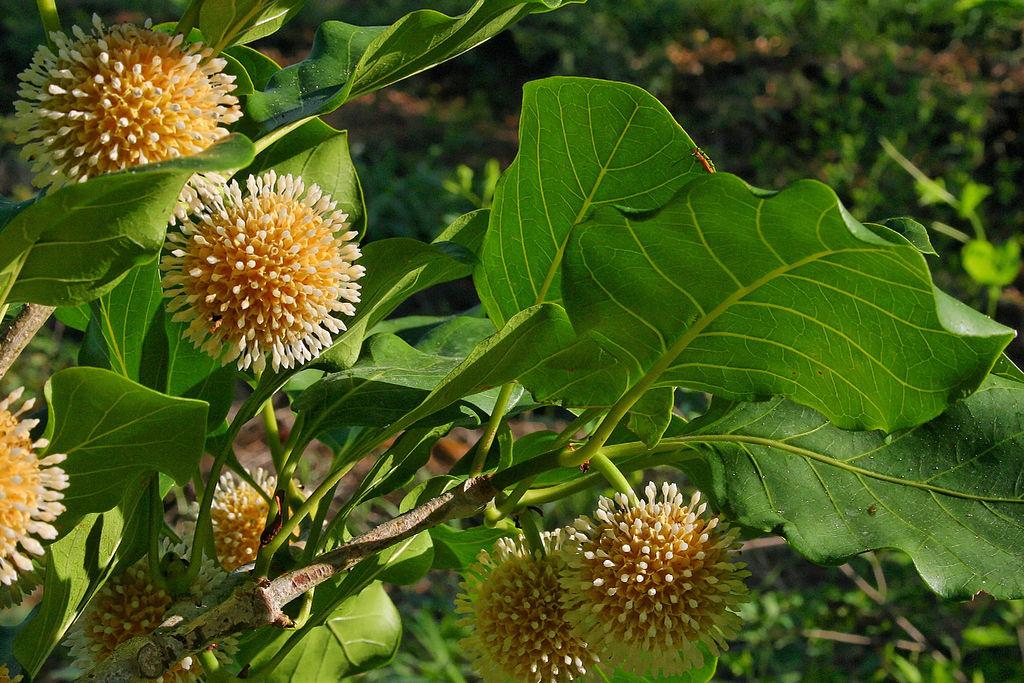 African peach (Nauclea latifolia) is a deciduous evergreen tree native to the Savanna forests of continental Africa. African peach is also commonly known as African fig and is a member of the Rubiaceae (coffee family) of flowering plants. African peach trees can grow up to 30 meters in height depending on their exposure to water. The tree produces an edible fruit which is strawberry-like in both taste and texture. The roots, fruit, bark and leaves of the plant are commonly used to treat a variety of ailments including sores, stomach disorders and malarial fever. Traditionally the herb is topically applied or consumed as a tincture, but commercially available capsules are available. Investigations into the effects of African peach have shown that water extracts possess antibiotic, analgesic, antiparasitic and antimalarial properties, supporting the anecdotal evidence from traditional medicine. Extracts of African peach may have sedative and anxiolytic properties, making them a possible treatment for insomnia or anxiety.
African peach (Nauclea latifolia) is a deciduous evergreen tree native to the Savanna forests of continental Africa. African peach is also commonly known as African fig and is a member of the Rubiaceae (coffee family) of flowering plants. African peach trees can grow up to 30 meters in height depending on their exposure to water. The tree produces an edible fruit which is strawberry-like in both taste and texture. The roots, fruit, bark and leaves of the plant are commonly used to treat a variety of ailments including sores, stomach disorders and malarial fever. Traditionally the herb is topically applied or consumed as a tincture, but commercially available capsules are available. Investigations into the effects of African peach have shown that water extracts possess antibiotic, analgesic, antiparasitic and antimalarial properties, supporting the anecdotal evidence from traditional medicine. Extracts of African peach may have sedative and anxiolytic properties, making them a possible treatment for insomnia or anxiety.

African Peach (Nauclea latifolia) may have sedative effects in animals. This sedation is due to the phytochemicals within the plant extracts. A number of studies have investigated the phytochemistry of the plant and in this regard a number of substances have been isolated and identified. These include alkaloids, flavonoids, terpenoids, saponins, tannins and derivatives of phenol. The alkaloids present in African peach belong to the indoloquinolizidine group, which is unique to plants of West Africa. Individual alkaloids present in the plant material include the main alkaloid constituent stricosamide, as well as angustine, angustoline, nauclene and naucletine. These alkaloids may explain the antimalarial, analgesic, antibacterial and antiparasitic effects of African peach. Some evidence suggests that the muscle relaxant effects of African peach may relate to the presence of the alkaloid stricosamide. The presence of flavonoids is not surprising as they are so universally found within the plant kingdom. Flavonoids belonging to the flavonol and flavone subclass have been shown to possess sedative and anxiolytic effects in animals and humans. Pictured is Nauclea orientalis, a tree from the same genus as the African peach. Nauclea orientalis is native to Asia, Australia and New Guinea. African peach differs in that the fruits do not have spikes and are red in colour. Image from: By Tony Rodd from Sydney, Australia (Nauclea orientalis 031208-3067) [CC BY-SA 2.0 (http://creativecommons.org/ licenses/by-sa/2.0)], via Wikimedia Commons
A number of animals studies have been performed to investigate the sedative and anxiolytic effects of African Peach extracts. For example, in one study, root bark extracts of African peach decreased the muscular activity of rats and prolonged the sleep time of rats administered the anxiolytic and sedative barbiturate drug pentobarbital. This would suggest that the root bark contains substances that are able to affect the central nervous system. In another study, extracts of African Peach were shown to have sedative and anxiolytic effects in mice. In yet another study, anxiety was reduced in mice experimentally infected with one form of malaria when African peach extracts were given. Therefore evidence from scientific studies support the evidence accumulated from traditional medicine, in that African peach may have sedative and anxiolytic effects, and may be useful in the treatment of malaria. However, human studies in this regard have not been performed and so it is difficult to make recommendations for this purpose.
Eat Well, Stay Healthy, Protect Yourself
RdB
